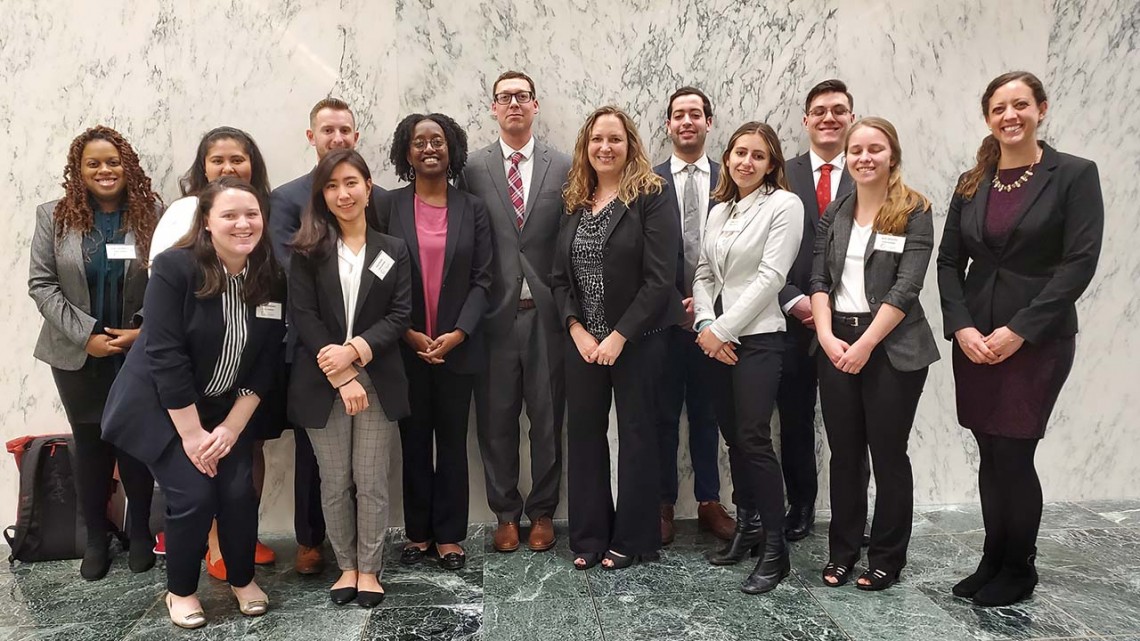
Project 2Gen Scholars went to Albany on April 30, led by Jamila Michener, center left, assistant professor of government; Chris Wildeman, center right, professor of policy analysis and management and director of the Bronfenbrenner Center; and Laura Tach, to Wildeman’s left, associate professor of policy analysis and management.
Project 2Gen discusses families, incarceration in Albany
By Sheri Hall
Cornell Project 2Gen – a community of researchers and practitioners focused on supporting children and their caregivers through a multigenerational perspective – visited Albany April 30 to share research about families and incarceration with New York state legislators.
Christopher Wildeman, associate vice provost for the social sciences, director of the Bronfenbrenner Center for Translational Research, director of the National Data Archive on Child Abuse and Neglect and professor of policy analysis and management, presented his research about how children are negatively affected by having parents in jail or prison.
And Jamila Michener, assistant professor of government, shared her research on the positive, multigenerational effects of providing education to prisoners.
After presenting their work to senators and assembly members, Wildeman and Michener then discussed with legislators and their advisors how research findings could shape policies and laws in New York state.
Project 2Gen, launched in 2017 by the Bronfenbrenner Center, addresses issues from the perspective of the entire family to highlight the importance of thinking about both caregivers and children when designing research, legislation and programming, said Elizabeth Day, a postdoctoral fellow for Cornell Project 2Gen who organized the event.
“The goal of our presentation was twofold: to create the opportunity for open discussion among researchers and policymakers around a topic that’s on the policy agenda, and to present nonpartisan research evidence taking a two-generation perspective to criminal justice,” Day said. “We really emphasize the educational approach; we weren’t there to promote any specific policy or program, but instead to provide a range of information including background, current statistics on the issue and a range of promising programs.”
Dianna Goodwin, a senior policy advisor to Sen. Luis Sepulveda, a member of the Senate Crime Victims, Crime and Correction Committee, said she found the presentations informative and useful.
“We hear many points of view on criminal justice reform in the Legislature, but not often results of careful academic study on real-world problems,” Goodwin said. “I really appreciated the thoughtful, well-researched information presented and will use it to inform my work. I look forward to a continued discussion and partnership with the 2Gen researchers.”
Halle Mahoney, a graduate student at the Cornell Institute for Public Affairs and a 2019 Cornell 2Gen Scholar, contributed to research on prison education programs in New York. She became interested in criminal justice policy after visiting Tent City Jail in Maricopa County, Arizona, as an undergraduate.
The Albany event, which she helped organize, underscored for her the importance of communication between researchers and policymakers, she said.
“Each of these groups has something to learn from the other,” she said. “I saw firsthand the importance of data in shaping policy. Data is really important for making evaluations of whether a program or policy is successful or not.
“The conversations I was part of during our visit,” she said, “showed how academic researchers have the tools and background to collect data and provide information for policymakers to make important decisions.”
Sheri Hall is a freelance writer in Ithaca, New York.
Media Contact
Get Cornell news delivered right to your inbox.
Subscribe


